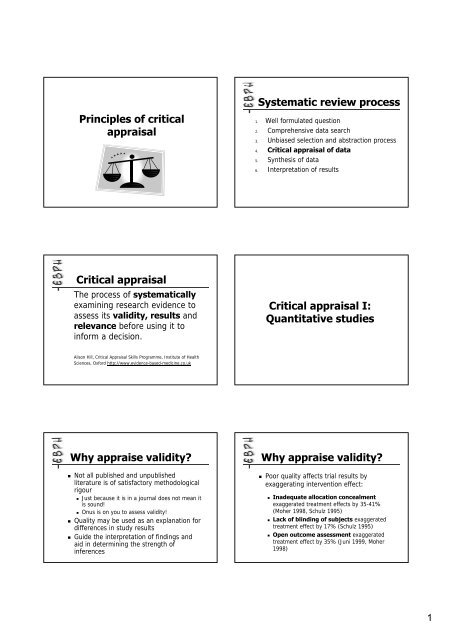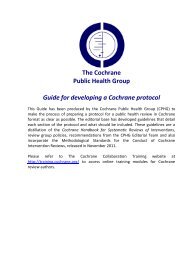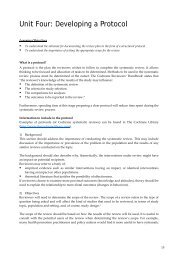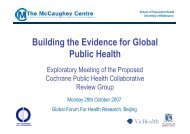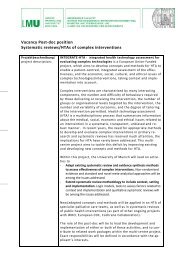Unit Eight: Principles of Critical Appraisal - Cochrane Public Health ...
Unit Eight: Principles of Critical Appraisal - Cochrane Public Health ...
Unit Eight: Principles of Critical Appraisal - Cochrane Public Health ...
You also want an ePaper? Increase the reach of your titles
YUMPU automatically turns print PDFs into web optimized ePapers that Google loves.
Systematic review process<br />
<strong>Principles</strong> <strong>of</strong> critical<br />
appraisal<br />
1. Well formulated question<br />
2. Comprehensive data search<br />
3. Unbiased selection and abstraction process<br />
4. <strong>Critical</strong> appraisal <strong>of</strong> data<br />
5. Synthesis <strong>of</strong> data<br />
6. Interpretation <strong>of</strong> results<br />
<strong>Critical</strong> appraisal<br />
The process <strong>of</strong> systematically<br />
examining research evidence to<br />
assess its validity, results and<br />
relevance before using it to<br />
inform a decision.<br />
<strong>Critical</strong> appraisal I:<br />
Quantitative studies<br />
Alison Hill, <strong>Critical</strong> <strong>Appraisal</strong> Skills Programme, Institute <strong>of</strong> <strong>Health</strong><br />
Sciences, Oxford http://www.evidence-based-medicine.co.uk<br />
Why appraise validity?<br />
• Not all published and unpublished<br />
literature is <strong>of</strong> satisfactory methodological<br />
rigour<br />
• Just because it is in a journal does not mean it<br />
is sound!<br />
• Onus is on you to assess validity!<br />
• Quality may be used as an explanation for<br />
differences in study results<br />
• Guide the interpretation <strong>of</strong> findings and<br />
aid in determining the strength <strong>of</strong><br />
inferences<br />
Why appraise validity?<br />
• Poor quality affects trial results by<br />
exaggerating intervention effect:<br />
• Inadequate allocation concealment<br />
exaggerated treatment effects by 35-41%<br />
(Moher 1998, Schulz 1995)<br />
• Lack <strong>of</strong> blinding <strong>of</strong> subjects exaggerated<br />
treatment effect by 17% (Schulz 1995)<br />
• Open outcome assessment exaggerated<br />
treatment effect by 35% (Juni 1999, Moher<br />
1998)<br />
1


